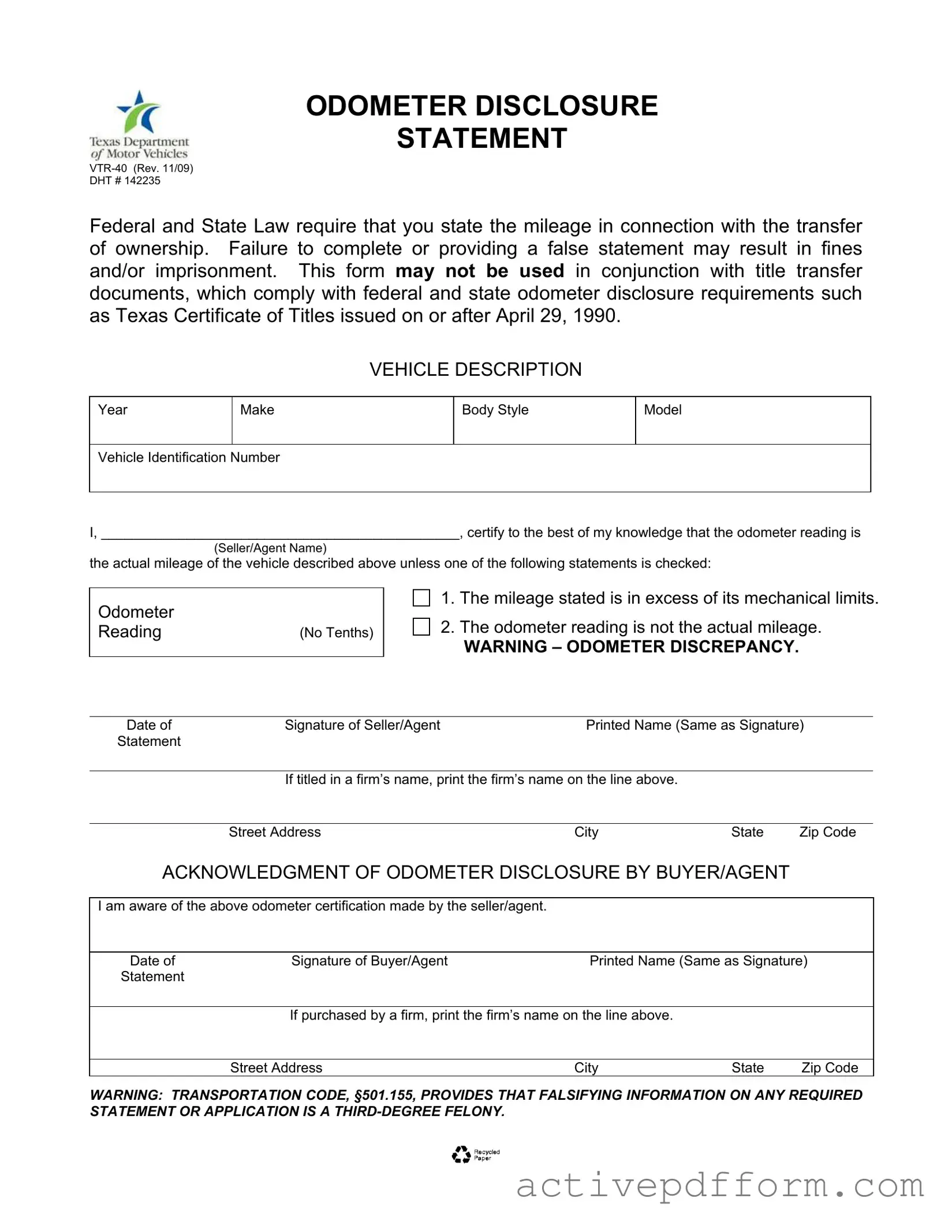Free Texas Odometer Statement Template
The Texas Odometer Statement form, known as VTR-40, plays a crucial role in vehicle ownership transfers. This form is essential for both buyers and sellers, ensuring that the mileage of a vehicle is accurately disclosed during the sale. Federal and state laws mandate that the odometer reading be stated clearly, as failure to do so can lead to serious legal consequences, including fines and imprisonment. The form includes specific sections for detailing the vehicle's description, such as the year, make, body style, model, and Vehicle Identification Number (VIN). Sellers must certify that the odometer reading reflects the true mileage, or indicate if the mileage exceeds mechanical limits or is otherwise inaccurate. Additionally, the form requires the signatures of both the seller and the buyer, along with their printed names and addresses, to acknowledge the odometer disclosure. This acknowledgment is vital, as it protects both parties in the transaction. Understanding the importance of this form can help ensure a smooth transfer of ownership and compliance with Texas regulations.
Document Specifics
| Fact Name | Details |
|---|---|
| Form Title | The form is officially known as the Odometer Disclosure Statement VTR-40. |
| Governing Laws | This form is governed by federal and state laws, including the Texas Transportation Code. |
| Legal Requirement | Both federal and state law require the disclosure of the vehicle's mileage during ownership transfer. |
| Consequences of False Information | Providing false information or failing to complete the form can lead to fines and/or imprisonment. |
| Usage Restrictions | This form cannot be used alongside title transfer documents that meet odometer disclosure requirements. |
| Certification Statement | The seller certifies that the odometer reading is the actual mileage unless otherwise stated. |
| Penalties for Falsification | Falsifying information on this form is classified as a third-degree felony under Texas law. |
Similar forms
-
Vehicle Title Transfer Form: Similar to the Texas Odometer Statement, this document is used during the transfer of vehicle ownership. It includes essential information about the vehicle and requires the seller to disclose any known issues, including odometer discrepancies.
- Trailer Bill of Sale: This form is essential for the legal transfer of trailer ownership in Arizona, capturing vital details such as buyer and seller information and sale price. For accurate completion, refer to the Arizona PDF Forms to ensure all necessary elements are included.
-
Bill of Sale: This document serves as a receipt for the sale of a vehicle. Like the Odometer Statement, it requires the seller to certify the vehicle's condition and mileage at the time of sale, protecting both parties in the transaction.
-
Odometer Disclosure Statement (Federal Form): This federal form is similar in purpose to the Texas Odometer Statement. It mandates that sellers disclose the vehicle's mileage to ensure transparency and prevent fraud during ownership transfers.
-
Vehicle Registration Application: When registering a vehicle, this application often requires the submission of mileage information. It parallels the Odometer Statement in its aim to provide accurate vehicle history.
-
Power of Attorney for Vehicle Transactions: This document allows one person to act on behalf of another in vehicle transactions. It may include mileage disclosures similar to those found in the Odometer Statement, ensuring that the agent is aware of the vehicle's condition.
-
Manufacturer's Certificate of Origin: This document is issued by the manufacturer when a vehicle is first sold. It includes information about the vehicle's mileage and ownership history, similar to the Odometer Statement's requirements.
-
Application for Title: This form is used to apply for a new title after purchasing a vehicle. It requires the disclosure of the odometer reading, aligning with the goals of the Odometer Statement.
-
Transfer of Title Form: This form is used when transferring a vehicle's title between individuals. It includes a section for odometer disclosure, much like the Texas Odometer Statement, to prevent misrepresentation.
-
Vehicle History Report: While not a legal document, this report provides information about a vehicle's past, including mileage records. It serves a similar purpose by helping buyers verify the accuracy of the odometer reading.
-
Insurance Application: When applying for vehicle insurance, applicants often must disclose the vehicle's mileage. This requirement is akin to the Odometer Statement, ensuring that insurance companies have accurate information.
Texas Odometer Statement Example

ODOMETER DISCLOSURE
STATEMENT
DHT # 142235
Federal and State Law require that you state the mileage in connection with the transfer of ownership. Failure to complete or providing a false statement may result in fines and/or imprisonment. This form may not be used in conjunction with title transfer documents, which comply with federal and state odometer disclosure requirements such as Texas Certificate of Titles issued on or after April 29, 1990.
VEHICLE DESCRIPTION
Year
Make
Body Style
Model
Vehicle Identification Number
I, ______________________________________________, certify to the best of my knowledge that the odometer reading is
the actual mileage of the vehicle described above unless one of the following statements is checked:
Odometer
Reading |
(No Tenths) |
1.The mileage stated is in excess of its mechanical limits.
2.The odometer reading is not the actual mileage.
WARNING – ODOMETER DISCREPANCY.
Date ofSignature of Seller/AgentPrinted Name (Same as Signature) Statement
If titled in a firm’s name, print the firm’s name on the line above.
Street Address |
City |
State |
Zip Code |
ACKNOWLEDGMENT OF ODOMETER DISCLOSURE BY BUYER/AGENT
I am aware of the above odometer certification made by the seller/agent.
Date of |
Signature of Buyer/Agent |
Printed Name (Same as Signature) |
Statement |
|
|
If purchased by a firm, print the firm’s name on the line above.
Street Address |
City |
State |
Zip Code |
WARNING: TRANSPORTATION CODE, §501.155, PROVIDES THAT FALSIFYING INFORMATION ON ANY REQUIRED STATEMENT OR APPLICATION IS A
Understanding Texas Odometer Statement
What is the purpose of the Texas Odometer Statement form?
The Texas Odometer Statement form, also known as VTR-40, serves to disclose the mileage of a vehicle during the transfer of ownership. Federal and state laws mandate this disclosure to protect buyers from potential fraud. Accurately reporting the odometer reading helps ensure that the buyer is aware of the vehicle's actual mileage, which can significantly impact its value and reliability.
Who is required to complete the Texas Odometer Statement?
The seller or their authorized agent must complete the Texas Odometer Statement. This individual certifies that the odometer reading is correct to the best of their knowledge. Both parties involved in the transaction—the seller and the buyer—must sign the form to acknowledge the odometer disclosure. This requirement ensures accountability and transparency in the sale process.
What happens if the odometer reading is not accurate?
If the odometer reading is not accurate, the seller must check the appropriate box on the form to indicate that the mileage is either in excess of its mechanical limits or not the actual mileage. Failing to provide accurate information can lead to serious consequences, including fines or imprisonment. Buyers should be cautious and verify the information to avoid potential disputes later on.
Can the Texas Odometer Statement be used with title transfer documents?
No, the Texas Odometer Statement cannot be used in conjunction with title transfer documents that comply with federal and state odometer disclosure requirements. For vehicles titled on or after April 29, 1990, the title itself will include the necessary odometer disclosure. It is important to use the correct documentation to ensure compliance with the law and avoid complications in the transfer process.
What are the penalties for falsifying information on the Texas Odometer Statement?
Falsifying information on the Texas Odometer Statement is considered a serious offense. According to Texas Transportation Code §501.155, providing false information is classified as a third-degree felony. This can lead to significant legal repercussions, including fines and imprisonment. It is crucial for both sellers and buyers to provide truthful information to avoid these severe penalties.
Dos and Don'ts
When filling out the Texas Odometer Statement form, it's essential to follow specific guidelines to ensure accuracy and compliance with the law. Here are ten important dos and don'ts to keep in mind:
- Do provide the correct odometer reading without any alterations.
- Do ensure that all required fields, such as the vehicle identification number and seller information, are completed.
- Do check the box if the odometer reading is not the actual mileage or if it exceeds mechanical limits.
- Do sign and date the form to validate your certification.
- Do keep a copy of the completed form for your records.
- Don't provide false information, as this can lead to serious legal consequences.
- Don't leave any sections of the form blank; incomplete forms may be rejected.
- Don't use this form in conjunction with title transfer documents that do not comply with federal and state requirements.
- Don't forget to inform the buyer/agent of any discrepancies in the odometer reading.
- Don't ignore the warning about the legal implications of falsifying information.
By adhering to these guidelines, you can help ensure a smooth transaction while fulfilling your legal obligations.
Check out Common Templates
Proxy Form for Hoa Meeting - This process is part of an effective homeowner association structure.
A New York Non-disclosure Agreement (NDA) is a legal document designed to protect sensitive information shared between parties. By signing this agreement, individuals or businesses commit to keeping specific details confidential, ensuring that proprietary information remains secure. Understanding the nuances of this form is essential for anyone looking to safeguard their intellectual property or trade secrets, and resources such as nytemplates.com/blank-non-disclosure-agreement-template/ can provide valuable templates and guidance.
I 589 Form - Completing the I-589 accurately is crucial to avoiding delays in processing.
